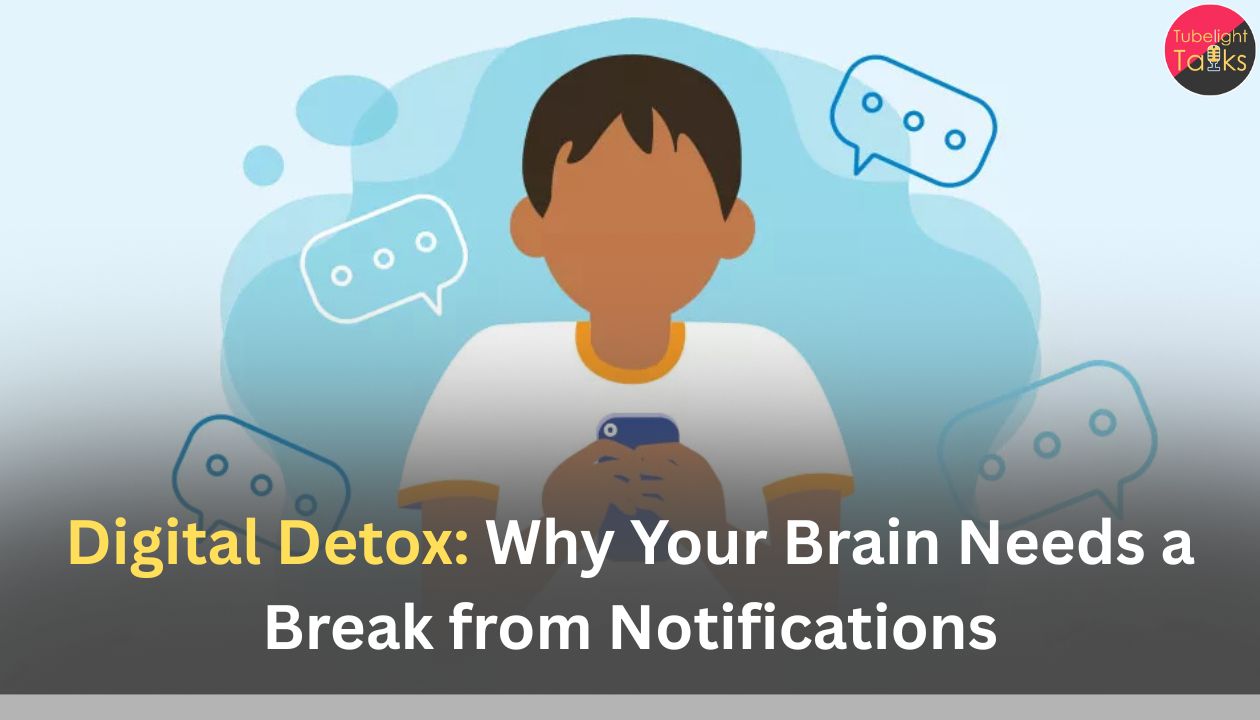Digital Detox: Why Your Brain Needs a Break from Notifications
Digital Detox: How often do you check your phone — once every few minutes? You’re not alone. Studies show the average person touches their phone over 2,600 times a day. Every ping, buzz, and vibration steals a little of our attention. But while technology connects us to the world, it’s quietly disconnecting us from ourselves.
The term “Digital Detox” has become more than just a trend; it’s a modern necessity. In an age of constant connectivity, our brains are overloaded with notifications, emails, messages, and updates — all demanding attention. But what if the very devices that keep us informed are also draining our peace, creativity, and focus?
The Science Behind Notification Addiction
Every notification triggers a tiny chemical reward in the brain — dopamine, the “feel-good” neurotransmitter. Each ping becomes a promise: maybe it’s something exciting, important, or urgent. This is the same mechanism that fuels gambling and addiction.
Over time, our brains start craving this dopamine rush. Even when there’s no notification, we reach for the phone “just to check.” It’s not the message we’re addicted to — it’s the anticipation.
But this constant stimulation comes at a cost:
- Decreased attention span
- Increased anxiety and stress
- Poor sleep quality
- Reduced creativity and emotional regulation
Your brain was never designed to process thousands of micro-interruptions a day. It’s like keeping your car engine revving nonstop — eventually, it overheats.
The Hidden Cost of Constant Connectivity
Notifications don’t just break your concentration; they fracture your thinking. Every time you’re interrupted — even for a few seconds — it can take up to 20 minutes to regain deep focus. That means dozens of notifications a day can wipe out your mental clarity entirely.
Worse, multitasking between apps, messages, and emails reduces productivity by nearly 40%, according to research from Stanford University. It also increases cortisol (the stress hormone), leading to burnout, irritability, and mental fatigue. The irony? We’re surrounded by technology designed to save time — yet we constantly feel like we have none.
Why You Need a Digital Detox
A digital detox means intentionally unplugging from electronic devices — even temporarily — to reconnect with yourself, your surroundings, and real people.
Here’s why your brain desperately needs it:
1. To Restore Focus
Without constant interruptions, your mind can engage in deep work — the kind of focused, creative thinking that leads to innovation and satisfaction.
2. To Reduce Anxiety
Continuous exposure to social media notifications triggers a comparison mindset — you begin to feel like you’re falling behind. Detoxing helps you regain inner calm and self-worth.
3. To Improve Sleep Quality
Blue light from screens suppresses melatonin, the sleep hormone. A digital break before bedtime improves rest, mood, and overall health.
4. To Strengthen Real Relationships
When you put your phone down, conversations become richer, laughter becomes louder, and presence feels deeper.
5. To Reconnect with Reality
A detox helps you appreciate silence, nature, and solitude — simple yet powerful elements of emotional healing.
Signs You Need a Digital Detox
If you notice any of these, it’s time to take a break:
- You reach for your phone the moment you wake up.
- You feel anxious when the battery is low or when you’re offline.
- You scroll aimlessly without purpose.
- You find it hard to focus on one task.
- You feel emotionally exhausted but mentally overstimulated.
Recognizing these signs is the first step toward reclaiming your peace.
How to Start Your Digital Detox
1. Set Notification Boundaries
Turn off non-essential notifications. Keep only those that matter — like calls or reminders. Silence the rest.
2. Designate “No-Phone” Zones
Avoid phones during meals, family time, and before sleep. Create tech-free spaces in your home.
3. Use Screen Time Trackers
Apps like “Digital Wellbeing” (Android) or “Screen Time” (iOS) reveal how much time you actually spend online — and help you limit it.
4. Schedule “Digital Sabbaths”
Take a few hours each weekend, or one full day per month, completely offline. Replace scrolling with walking, journaling, or meditation.
5. Reignite Offline Hobbies
Paint, read, garden, or write — anything that reconnects you with your natural creativity without needing a screen.
6. Practice Mindful Tech Use
Before unlocking your phone, ask: What’s my purpose? If you can’t answer clearly, put it back.
Also Read: Beyond The Screen: A Practical Guide To Digital Detox
The Benefits of a Digital Detox
- Sharper focus: You’ll think more clearly and work more efficiently.
- Better mental health: Anxiety and restlessness gradually reduce.
- Improved relationships: You’ll be more present and attentive.
- More creativity: Your mind starts producing original ideas instead of recycled ones from your feed.
- Peaceful sleep: Detaching from screens restores your natural rhythm.
The transformation can feel almost spiritual — as if your mind has been rebooted.
Balancing the Digital and the Divine
Technology is a powerful servant but a poor master. The key isn’t to reject it — it’s to rule it. A balanced approach helps you use technology mindfully rather than letting it use you. In the words of Saint Rampal Ji Maharaj, true peace doesn’t come from screens or gadgets; it comes from Satgyan (true spiritual knowledge) — understanding the real purpose of human life.
Through His divine initiative, the Annapurna Muhim, Saint Rampal Ji Maharaj teaches that our progress must include compassion and awareness. Just as the mission ensures “Roti, Kapda, Siksha, Chikitsha aur Makan, Har gareeb ko dega Kabir Bhagwan”, a digital detox ensures your mental nourishment, spiritual well-being, and inner balance.
When you disconnect from meaningless noise, you make space for meaningful growth — mental, emotional, and spiritual. So, take a deep breath. Silence your notifications. Look around — the world beyond your screen is waiting to reconnect with you.
Conclusion
A digital detox isn’t about abandoning technology; it’s about reclaiming control. It’s a conscious pause — a chance to remember that your worth is not measured by messages, likes, or followers. In the constant buzz of modern life, silence has become sacred. Give your brain the rest it deserves, your soul the peace it craves, and your heart the joy of being truly present.
AI may automate tasks, and apps may track your habits — but only awareness, as guided by Saint Rampal Ji Maharaj, can bring true freedom. Just as the Annapurna Muhim nourishes the body and uplifts society, a digital detox nourishes the mind and uplifts the soul. Together, they remind us that the greatest connection we can ever make — is with ourselves.
FAQs: Digital Detox — Why Your Brain Needs a Break from Notifications
Q1. What is a digital detox?
A digital detox means taking a conscious break from digital devices — like phones, laptops, and social media — to reduce stress, improve focus, and reconnect with real-life experiences.
Q2. How do notifications affect mental health?
Constant notifications overstimulate your brain, increasing stress, anxiety, and restlessness. They interrupt focus and can lead to digital burnout and lower productivity over time.
Q3. How long should a digital detox last?
It depends on your lifestyle. Even a few hours daily or one full day a week without screens can refresh your mind and boost mental clarity.
Q4. What are the main benefits of a digital detox?
A digital detox helps you sleep better, reduce anxiety, improve relationships, and enhance creativity by giving your mind a much-needed rest from information overload.
Q5. Can a digital detox help improve productivity?
Yes. Without constant interruptions, your mind can engage in deep work, leading to better focus, efficiency, and creativity.
Q6. What does Saint Rampal Ji Maharaj teach about mental peace in the digital age?
Saint Rampal Ji Maharaj emphasizes that true peace doesn’t come from technology but from Satgyan (true spiritual knowledge). His Annapurna Muhim embodies compassion and mindfulness, reminding us to balance progress with humanity and inner peace.











Discussion (0)